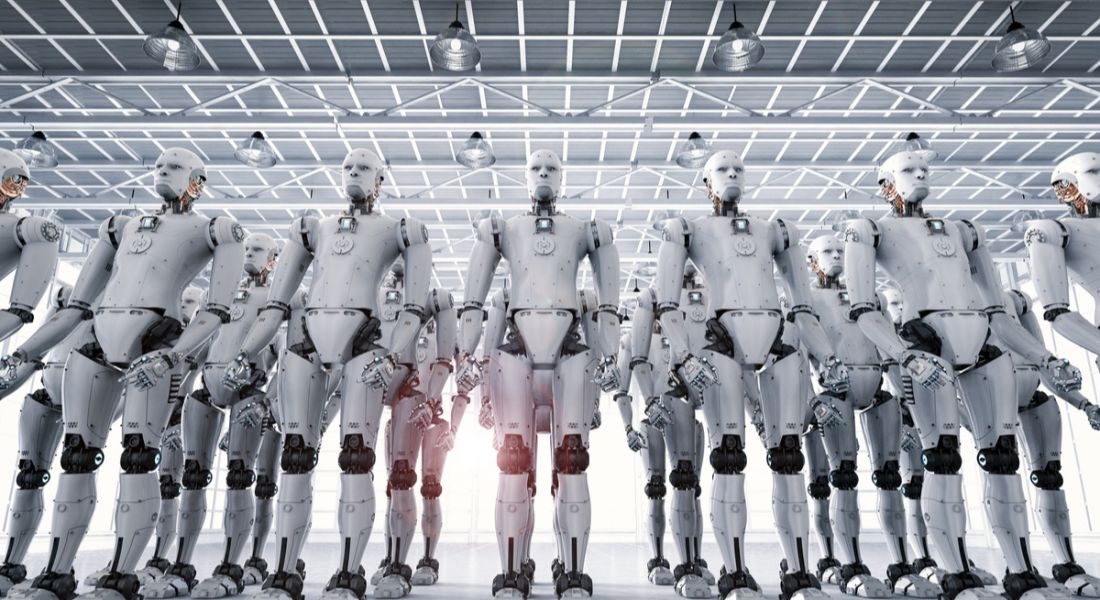Ireland’s young workforce is dangerously exposed to the threat of automation, ranking 26th out of 35 OECD countries in terms of efforts at upskilling.
The robots are coming for entry-level jobs. The only way that countries such as Ireland, for example, can endure in the oncoming age of automation is to invest now in young workers’ skills and training.
Findings published in the PwC Young Workers Index 2017 show a potential $1.2trn boost to OECD economies in the long term through improving young workers’ skills, enrolment in education and job opportunities.
‘Many young people with lower education level – and particularly young men in sectors like retail, transport and manufacturing – could face major challenges from automation if they do not upgrade their skills over the course of their careers’
– JOHN HAWKSWORTH
Ireland would receive a GDP boost of €10bn, or 3.6pc, in the long run if it lowered the number of young workers not in education or training (NEET) to similar levels of those in Germany, for example.
Across OECD countries, existing jobs for young workers could be at risk of automation by the early 2030s. Overall, however, we see offsetting job creation for young workers giving a broadly neutral impact across the OECD in the long run.
There will be considerable disruption to labour markets in the process and it will require retraining and other support to those who lose their jobs, to help them find work elsewhere.
Who is most at risk?
PwC chief economist John Hawksworth argued that enhanced vocational training, and STEM skills in particular, are needed to make young people adaptable enough to thrive in an increasingly automated world.
The latest available information shows that the proportion of NEET young workers is back down to its pre-crisis levels of around 17pc on average across the OECD. However, youth unemployment levels remain high in many countries, notably in southern Europe. Ireland’s NEET rate for 20-24-year-olds is 17pc (from 26.1pc in 2011).
On average, students from lower socioeconomic backgrounds are three times more likely not to achieve a baseline level of proficiency in science. This disparity is especially pronounced for young men with low education levels, who could face risks of automation of up to 50pc by the early 2030s, compared to only around 10pc for both male and female university graduates.
Reducing NEET levels across OECD countries to the same level as Germany, one of the top performers in the index, could boost total OECD GDP by around $1.2trn in the long term.
“Automation through technologies like AI and robotics will boost productivity and wealth, and so create many new opportunities for young people with the right skills,” Hawksworth said.
“However, our analysis also shows that many young people with lower education levels – and particularly young men in sectors like retail, transport and manufacturing – could face major challenges from automation if they do not upgrade their skills over the course of their careers.
“A focus on providing young people with the right education and vocational training will be critical to preparing them for the more automated workplace of the future,” Hawksworth urged.
Switzerland, Iceland and Germany are the top-ranked OECD economies in the PwC index for a second year. Countries such as Germany have further improved their already high index scores this year as youth unemployment and NEET rates have fallen further. The US, the UK, Czech Republic, Canada and Poland are among those countries that have risen in the rankings since last year.
Ireland is in the sights of the job-killer robots
Despite Ireland’s economy standing to gain €10bn by investing in skills, the question remains as to whether the country will move fast enough to embrace STEM skills in its education system.
According to the OECD figures, the country is dangerously exposed to automation, and Ireland still ranks a measly 26th out of 35 OECD countries.
The key reason for the low score is due to Ireland’s relatively high proportion of young workers not in education, employment or training – though this has improved since 2011.
“As a nation, and in the light of many businesses experiencing skills challenges, Ireland has some work to do to ensure its young people are equipped with the skills needed for a digital world, including providing the right training and education,” warned Gerard McDonough, director of people and organisation at PwC.
His colleague, Ciara Fallon, also director of people and organisation at PwC, said that more needs to be done to encourage more young people into STEM careers.
“By contrast, young workers with strong STEM skills should be less at risk from automation across most OECD countries. STEM-focused sectors remain a relatively small employer of young workers, but demand for these skills is rising fast, leading to a skills gap. More needs to be done to address gaps in STEM skills, particularly for young people from more disadvantaged backgrounds, if new digital technologies are not to add to income and wealth inequalities in the long run,” Fallon said.




